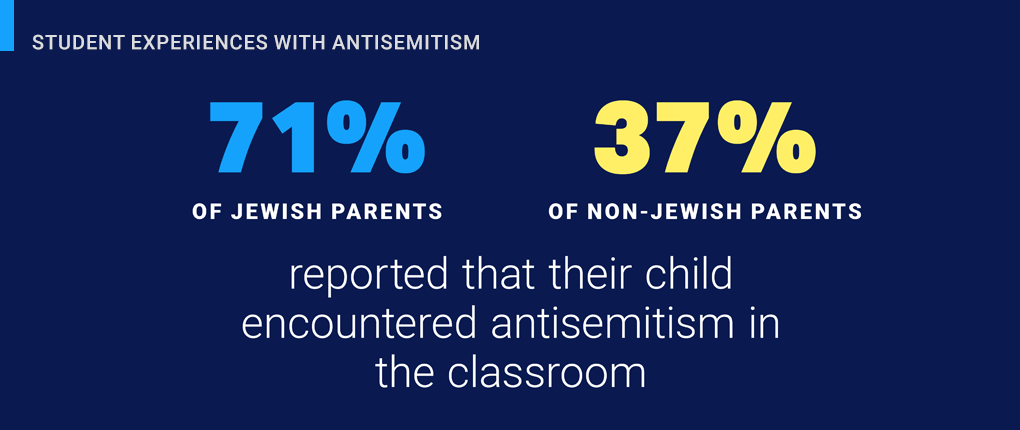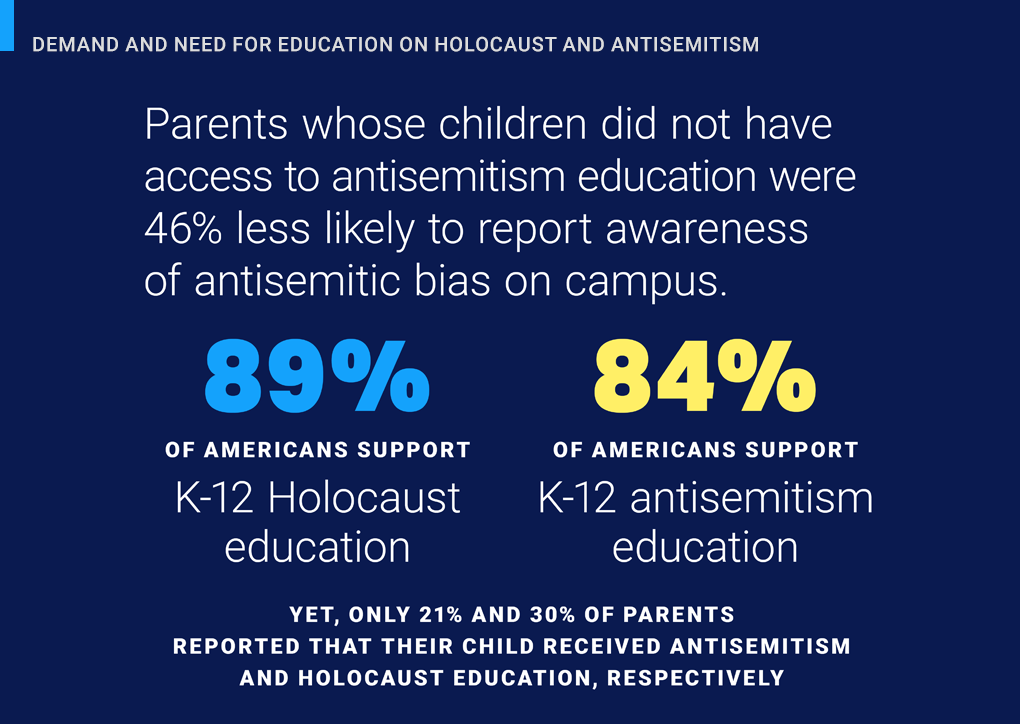Combating Antisemitism in K-12 Schools Insights and Actions
Related Content
Highlights
In October 2024, the ADL Center for Antisemitism Research (CAR) conducted a survey of 817 American adults. The findings for those who were surveyed show that:


Take Action
Schools and school districts should:
- Formally include antisemitism awareness education in all anti-bias and non-discrimination programming.
- Adopt Holocaust and genocide curricula offerings.
- Provide mandatory antisemitism awareness and Holocaust education professional development trainings for all educators.
- Ensure that lesson plans are free from antisemitic bias toward Jews or the State of Israel, and that they do not unintentionally amplify or perpetuate antisemitic beliefs or attitudes in school community.
- Ensure that robust incident reporting mechanisms are in place and are known to members of the school community.
Introduction
Antisemitism is increasingly affecting younger populations, with a disturbing 135% rise in incidents in K-12 schools over the past year, paralleling national trends.[1] This escalation highlights the urgent need for targeted interventions in educational environments to combat these prejudices from an early age.
Research by the ADL Center for Antisemitism Research (CAR) highlights the significant impact of Holocaust education in reducing antisemitic attitudes. At the same time, an October 2024 nationally representative CAR survey of American adults has revealed that 84% of Americans support the implementation of antisemitism education in K-12 schools, while 89% support implementation of Holocaust education in K-12 schools. The same survey shows a high correlation between exposure to such education and the likelihood of antisemitic incidents being reported when they occur in the classroom.
Despite this, only 29 states mandate Holocaust education and, as the 2024 CAR survey shows, only a fraction of current K-12 parents surveyed indicated that their child's school offered antisemitism (21%) or Holocaust education (30%). This represents a critical gap that must be addressed.
Yet, the overwhelming public endorsement of Holocaust and antisemitism education provides a compelling mandate for policymakers and educators to take immediate action to ensure comprehensive education on these topics is integrated into K-12 curricula across all states.
ADL aims to rally educators, parents, policymakers, and communities to prioritize these educational reforms, fostering understanding and preventing bias in future generations. In particular, the recently created Ronald Birnbaum Center to Combat Antisemitism in Education (CCAE) has adopted a whole-of-society approach to address these challenges by providing strategies to enhance the safety of Jewish students, faculty and staff; holding educational institutions accountable; and empowering Jewish communities and allies with resources to advocate effectively against antisemitism.
Antisemitism in K-12 Schools
Antisemitism in K-12 schools has become an urgent concern, as evidenced by the
1,162 antisemitic incidents recorded by ADL in non-Jewish schools in 2023, up from 495 incidents in 2022. This surge is not confined to isolated incidents but reflects a broader, deeply troubling trend across educational settings, public and private alike.
New research conducted by CAR indicates that more than a third of all parents surveyed report their children have witnessed or experienced antisemitism in classrooms or through course materials, including a third of public-school parents and three quarters of private school parents surveyed. This finding requires further research given that while it could mean that antisemitism is more rampant in private schools than public schools, it might also indicate that people in private schools are in fact just more aware of and better able to recognize antisemitism in their environment.
The disparities are particularly pronounced between Jewish and non-Jewish families. A significant 71% of Jewish parents surveyed noted that their child experienced antisemitic incidents at school. Critically, 37% of non-Jewish parents also reported that their child had disclosed encountering antisemitism at school.
All parents surveyed were asked to indicate whether their child had ever witnessed or experienced any of a series of bias incidents in the classroom or course materials related to Jews or Israel. For every incident type, more Jewish than non-Jewish parents reported their child having experienced or witnessed it in schools.
These discrepancies highlight two key factors. First, Jewish students, due to their identity, are more likely to be targeted by and notice antisemitism. Second, there is a strong correlation between students' access to Holocaust and antisemitism education and their ability to recognize antisemitic incidents when they occur. Parents whose children did not have access to antisemitism education were 46% less likely to report awareness of antisemitic bias on campus. This suggests that the reported rates of antisemitic or anti-Israel incidents are likely underestimated and that such education plays a critical role in increasing awareness and understanding of antisemitic bias.
It is also worth noting that the increase in incidents is reflected not only in reported incident data but also in the concern about the widespread nature of antisemitism. In fact, more than one in five adults (21%) indicated that they thought anti-Jewish prejudice was “very” or “extremely” problematic in their local school district. Jewish respondents were even more likely to be concerned, with more than two in five Jewish adults (40%) saying the same, with Jewish parents exhibiting higher levels of concern (47.6%) than Jewish non-parents (35.5%). Thus, contrary to the common perception that older and more conservative Jewish adults are more likely to view antisemitism as a significant issue, Jewish parents of K-12 children are significantly more likely to hold this concern. Among these parents, 71% report that their child has personally experienced antisemitism.
Education as a Tool Against Antisemitism
Education can be a powerful weapon against antisemitism, as evidenced by both ADL research showing a significant relationship between Holocaust education and a reduction in antisemitic attitudes and by widespread public support for Holocaust and antisemitism education in schools.
CAR research reveals that 84% of U.S. adults support offering antisemitism education, whether optional or mandatory, in their local school districts. An even higher percentage, 89%, advocate for Holocaust education. Among parents, 86% support antisemitism education, and 88% endorse Holocaust education; notably, 52% of parents believe Holocaust education should be mandatory.
Despite this broad public backing, there is a significant gap in educational offerings. Currently, only 21% of parents surveyed report that their child’s school provides antisemitism education, and 30% have access to Holocaust education, with a mere 15% receiving both.
These findings underscore the urgent need for school districts and policymakers to act decisively. To address the disconnect between public support and actual implementation, the ADL Ronald Birnbaum Center to Combat Antisemitism in Education (CCAE) is asking education leaders to take concrete steps to:
- Integrate Antisemitism Awareness into Anti-Bias and Non-Discrimination Programs: Schools should formally include antisemitism education within anti-bias and non-discrimination programming. This integration ensures that students can recognize and report antisemitic behavior and understand its broader implications.
- Mandate Holocaust and Genocide Education: Schools should adopt mandatory Holocaust education for students and provide professional development for educators. This education ensures current and future generations understand the importance of confronting antisemitism and hate and the dangers of remaining silent.
- Eliminate Bias in Educational Materials: Schools must ensure lesson plans are devoid of antisemitic bias, including regarding Israel. It's essential to preemptively address and correct educational content that might perpetuate antisemitic beliefs.
- Establish Strong Reporting Systems: Effective reporting mechanisms for antisemitic incidents should be in place, widely known, and accessible. This creates a safe environment for students, staff and parents to speak out against bias and discrimination.
This is a pivotal moment for the fight against antisemitism. By mandating Holocaust and antisemitism education in their states, school districts and policymakers can leverage overwhelming public support to foster inclusive school environments that equip future generations to resist and combat prejudice. The time to act is now; the tools are available, and public endorsement is clear – let’s use education to build a foundation of zero tolerance for antisemitism.
Methodology
In October 2024, CAR conducted a nationally representative survey of 817 American adults through the Ipsos Observer panel to understand views on antisemitism and Holocaust education, perceptions of anti-Jewish and other forms of prejudice in local school districts, and, in the case of parents, their child’s experience with antisemitism at school and in course materials. Respondents completed the Qualtrics-based survey online over a weeklong period, with fielding opening on October 8 and closing on October 16. The sample was balanced to match 2023 American Community Survey (ACS) benchmarks across race, ethnicity, age, and education level.
Of the 817 adults surveyed, 27% (n = 223) were parents of at least one current K-12 student. 11.8% (n = 96) of all respondents were Jewish, representing a significant oversample of the American Jewish population. Though most of these were public school students, a significant proportion were parents of K-12 students in private and charter schools. The margin of error for the survey was +/-4.2%.
[1] ADL’s annual Audit of Antisemitic Incidents tracks incidents of antisemitic harassment, vandalism, and assault in the United States.









